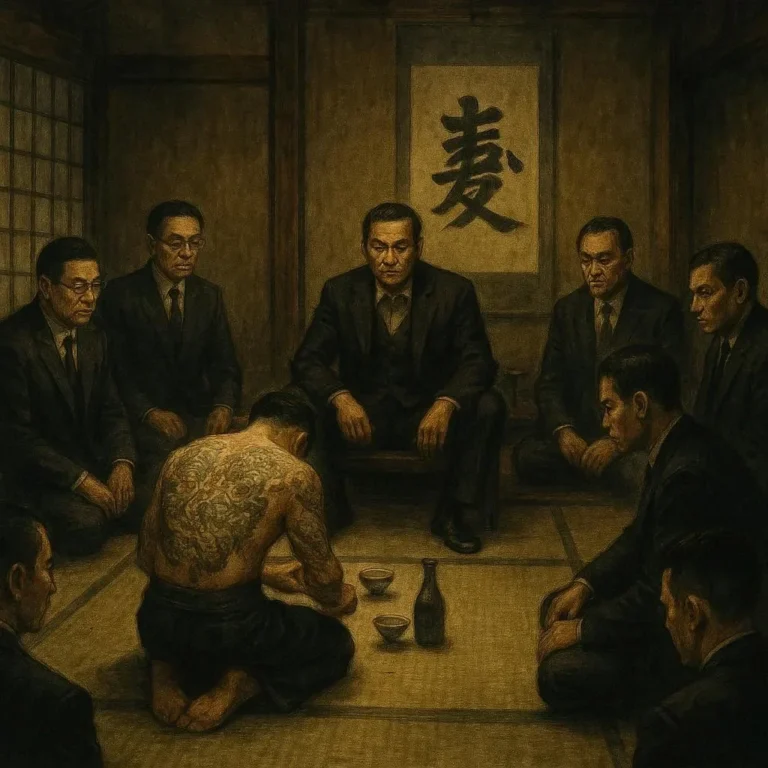507 views Moral Codes in Crime: The Unspoken Ethics of the Yakuza
Introduction
In the shadowy corners of Japan’s underworld, the Yakuza operates with a paradoxical blend of criminal ruthlessness and a surprisingly rigid moral system. While most media portray organized crime purely as a carpet‑bag of violence and corruption, a deep dive into the Yakuza code of conduct reveals a structured ethical framework that echoes Japan’s feudal past and borrows heavily from Bushido—the samurai warrior code. Understanding these unspoken ethics is essential not only for scholars of organized crime but also for anyone trying to comprehend why the Yakuza continues to thrive in contemporary society.
A Brief History of the Yakuza’s Moral Roots
The modern Yakuza organization traces its lineage back to the jitō of the Edo period, guild-like groups of gamblers, street vendors, and goons who protected local communities from samurai excesses. When the Tokugawa shogunate dissolved in 1868, these groups morphed into the yakuza clans we recognize today. Their ethical charter, often called the “Yakuza Code” or ninkyo, was formalized in the early 20th century. The code draws heavily from Bushido—a philosophy that prized loyalty, sacrifice, and personal integrity. However, unlike the samurai’s moral compass, the Yakuza’s code adapts its tenets to fit a criminal context.
Core Principles
Three pillars underpin the Yakuza’s moral universe:
- Loyalty and Hierarchy – Members swear fealty to their oyabun (boss) and adhere to a strict rank structure. Betrayal is met with severe punishment, often fatal. The emphasis on loyalty mirrors the feudal patron‑client relationships that were the backbone of Japan’s pre‑modern era.
- Honor and Self‑Sacrifice – The ninkyo emphasizes personal honor above mere financial gain. Members may be expected to die for their organization, a practice that serves both as deterrence against internal treason and as a dramatic display of commitment to outsiders.
- Respect for the Unseen and the Public – Yakuza leaders are expected to host charitable events, such as street festivals or disaster relief. These acts generate public goodwill while reinforcing the group’s image as a protector of the vulnerable.
The Psychological Allure of a ‘Criminal Code’
Why do individuals willingly submit to a code that can sanction murder, extortion, or economic sabotage? The answer lies in cognitive dissonance and the allure of belonging. For many, the Yakuza’s formal rituals—from tattoo ceremonies to the ritualized yubitsume (hand‑snip) as a penalty for transgression—provide a structured way to justify otherwise irrational wrongdoing. The organizational hierarchy offers clear status markers: a rising kumi (crew) leads to higher rank and thus greater prestige. When society randomizes lawlessness, these systems give participants a sense of belonging and an ethical justification for their actions.
Rituals and Tattoos
Yakuza tattoos are more than body art; they represent a covenant with the organization. The irezumi covers large areas of skin with intricate scenes from folklore and symbolic imagery, encoding each member’s narrative. These tattoos act as living documents of one’s status and past mistakes. Moreover, the act of repeatedly re‑inking over a lifetime demonstrates resolve—a visible vow to uphold the code forever.
Modern-Day Manifestations: Ethics in the 21st Century
The Yakuza’s morality system is not a relic. In contemporary Japan, the criminal code continues to guide a multibillion‑dollar empire involved in real estate, construction, gambling, and even finance. The Aoyama style of leadership—emphasizing “soft power”—contrasts with the earlier “hardline” approaches seen in the Kansai gangs. Today, the code is more about image management than authoritarian law.
Corporate Integrations
The Yakuza’s infiltration into legitimate businesses is a direct extension of their ethical system. By participating in corporate diversification, they create legal nodes that conceal crime. Ethics manifest in the practice of lobbying for favorable legislation, a modern form of “sacrifice” where the organization bids for political leverage. They protect each other through political lobbying, which is a part of the guild’s ninkyo of mutual support.
Public Perception and Counter‑Narratives
Public sentiment oscillates between fascination and fear. Reports in mainstream media often highlight the Yakuza’s “honorable” gestures: distributing disaster relief, maintaining public order during crises, or safeguarding the reputation of the local economy. However, counter‑narratives reveal an unspoken truth: the exploitation of the poor, the perpetuation of conspiratorial violence, and the internal violence that occurs when the code degenerates into power struggles.
The Debate: Moral Ambiguity vs. Criminal Enterprise
Scholars debate whether the Yakuza’s code is an ethical system or a self‑justifying tool. Below are key arguments from both sides:
| Pro‑Code Perspective | Counterpoint |
|———————–|————–|
| The code preserves social cohesion within the organization, reducing internal violence. | It merely masks the organization’s criminal nature and allows it to co‑opt backlash. |
| Member compliance arises from genuine belief in the code’s principles. | Compliance results from coercion, fear, and social pressure. |
| Rituals promote a mental discipline that keeps members in check. | Rituals exploit psychological vulnerabilities, reinforcing subservient behavior. |
The essence remains: the Yakuza’s moral code works for them, even if it is ethically dubious in broader society.
Implications for Law Enforcement and Policy
Japan’s police and judiciary face a paradox. Enforcing a purely criminal focus risks losing the cultural leverage that Yakuza can exert, yet ignoring the code invites chaos. Recent policy reforms—like the Sakigake Kōjō No Rakutoriumu—aim to dismantle illicit graft with targeted investigations. However, without understanding the code’s internal logic, law‑enforcement actions can inadvertently weaken the social safety net the Yakuza claim to provide.
Recent Shifts
The Security Legislation reform of 2023 increased penalties for Yakuza affiliation, which in turn pressured the organizations to ramp up top‑level secrecy. This leads to two outcomes:
- Increased infiltration of high‑level white‑collar crimes (fraud, insider trading), where the code’s protective network is advantageous.
- More brutal internal violence as leaders scramble to maintain influence, pushing the code to its limits.
Conclusion: Where Does the Moral Border Really Lie?
The Yakuza’s unspoken ethics serve as a stark reminder that even the most reviled institutions can possess complex moral frameworks. While the world may label them as criminals, the reality is far more nuanced: a legal order built on loyalty, sacrifice, and public service aesthetics. For policymakers, the lesson is clear: dismantling crime requires more than just legal crackdowns; it demands an in‑depth understanding of the cultural ecosystems that sustain these entities.
In the final analysis, the Yakuza’s moral code is neither pure **virtue nor outright *vice*. Instead, it occupies the dangerous gray area where societal norms intertwine with criminal adaptability, proving that sometimes *code can be a weapon for both unity and oppression*. Understanding this duality is essential for any serious study of organized crime—whether in Japan or globally.






